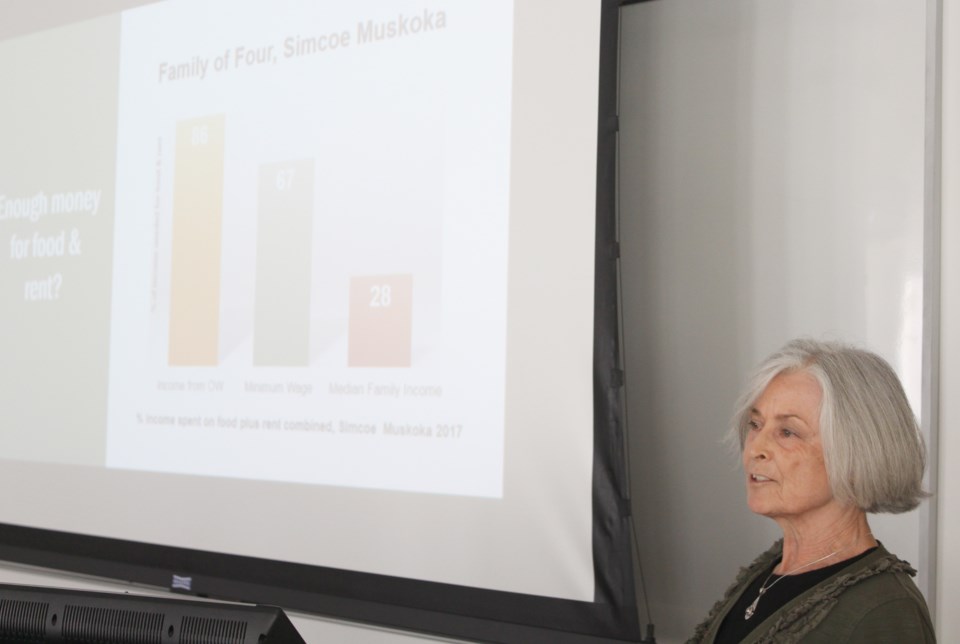City councillors got a glimpse into a widespread, often overlooked problem that is rampant in our region and has a devastating impact on tens of thousands of people.
That problem is household food insecurity, said Jane Shrestha, a public health nutritionist for the Simcoe Muskoka District Health Unit, who brought the issue to the council table this week.
“Household food insecurity is defined as inadequate or insecure access to food specifically due to financial constraints,” said Shrestha. “In other words, it’s about people not having enough money to buy food.”
As part of her plea to council, Shrestha presented some grim statistics.
“It may not be a very visible problem, but it is a significant problem. About one in eight households in Simcoe and Muskoka area are experiencing some degree of food insecurity,” said Shrestha. “That works out to be approximately 70,000 people. To put that in perspective, that is about the populations of Orillia, Collingwood and Huntsville combined.”
Those numbers only tell part of the story.
“By the time people are in a position where they are worried about having enough money for food, there’s a pretty good chance they have borrowed whatever they can from family and friends to pay for food, they have maxed out their credit cards, they have moved to less expensive accommodation, they’ve looked at liquidating their possessions … (and) even sent their children to live with other family members or friends,” she explained of the difficult decision many people face.
The statistics, she noted, have remained static for several years. “That tells us we’re not getting to the root of the problem,” she said.
Why should others care about this issue? “We care because it has a huge impact on people of all ages,” said Shrestha. “It has an impact on physical health, it has considerable impact on mental health and social health for children, adolescents and adults which then has an impact on communities.”
When people are unable to afford healthy food, there is a ripple effect that impacts everyone. She referenced a recent study of 70,000 households in Ontario that showed the more “food insecure” a person is the greater their use of various health services.
“For someone who wasn’t worried about food insecurity, their annual health care costs were $1,600,” said Shrestha. “For someone who was extremely food insecure, those costs were close to $4,000. (That shows) a pretty strong connection and it’s costly.”
Less easy to quantify is the social isolation and other side effects.
She said much effort is invested into helpful programs such as community gardens, the good box food program and others. She also lauded the efforts of food banks.
“The challenge is it takes more than food to solve hunger,” Shrestha told city councillors. “The root cause is poverty. Right now, communities and charitable organizations like food banks do a lot to help people with urgent food needs, but food is not the underlying problem. Not having enough money to buy food remains.”
A different approach is needed to ease the crisis, she said. Municipalities have a role to play in that, she stressed, adding Orillia has tried to address the issue.
“Municipalities are already doing things that impact the amount of money people have in their pockets for food and certainly Orillia’s affordable housing action plan and the work that has been done over the last few years to revise the recommendations is important,” said Shrestha said. “Affordable housing is important. The presence of the Orillia Food Council, which takes a look at issues related to food insecurity and work other community groups do is important … things are happening.”
But more needs to be done, she said. The health unit is asking municipalities throughout the region to advocate for provincial policies such as social assistance rates that match the true cost of living and continuation of the Ontario Basic Income Pilot.
They would also like to see poverty monitored at the municipal level and encourage councils to consider that data in its planning decisions.
“An example of that is ensuring low-income neighbourhoods are well served by transit that takes them to other areas where there are employment opportunities and sources of training and education,” she said. “When it comes to creating a climate for entrepreneurship maybe considering support (for) mentoring opportunities for those with limited means.”
Shrestha also encouraged councillors to continue to support affordable housing, economic development and other policy initiatives that have “the potential to increase the disposable incomes of Orillia residents vulnerable to food insecurity.”
Orillia Mayor Steve Clarke acknowledged the issue is an important one.
“I think food insecurity is such a significant indicator of mental health, physical health and social health,” he said, likening it to the health-care system, in general. “We spend so much time and effort and resources on acute health care … when they come through the front door of the hospital (when) the true benefit to the community (lies in what) we do for them before they go into the hospital.”
Council voted to forward the presentation to the Orillia Food Council and is asking them to “report to council with suggestions that council could consider for implementation.” That was a move pushed by Coun. Sarah Valiquette-Thompson, a member of the food council.
“If we can be creative locally through our government and through our own resources – with different, creative ways to grow healthier food and get education out there into family’s hands – I think that would be phenomenal.”
She sees council taking a bigger role in the future.
“I think the next term of council should be very open to the idea of creating a food and health sustainability committee that would come under the municipal umbrella. (That) is actually being practiced across the country right now … to bring the issue front and centre. Finally, the movement has begun and I think that’s the future,” she said.
